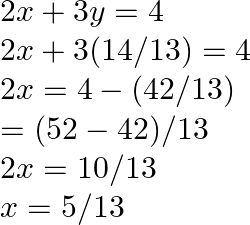Solution:
(i) ![]()
On simplifying the expression we obtain,
![Rendered by QuickLaTeX.com \begin{array}{l} x(2-3 i)+i y(2-3 i)=4+i \\ 2 x-3 x i+2 y i-3 y i^{2}=4+i \\ 2 x+(-3 x+2 y) i-3 y(-1)=4+i\left[\text { since, } i^{2}=-1\right] \\ 2 x+(-3 x+2 y) i+3 y=4+i\left[\text { since, } i^{2}=-1\right] \\ (2 x+3 y)+i(-3 x+2 y)=4+i \end{array}](https://www.learnatnoon.com/s/wp-content/ql-cache/quicklatex.com-ff85d9ed02f6a6c78846b3c373c1bb47_l3.png)
Equating the Real and Imaginary parts on both the sides, we obtain
![]()
And ![]() (ii)
(ii)
Multiplying eq.(i) by 3 and eq.(ii) by 2 and add
By solving we obtain,

On substituting the value of ![]() in eq.(i) we obtain,
in eq.(i) we obtain,

![]()
As a result, the real values of ![]() and
and ![]() are
are ![]()
(ii) ![]()
Given that
![Rendered by QuickLaTeX.com \begin{array}{l} (3 x-2 i y)(2+i)^{2}=10(1+i) \\ (3 x-2 y i)\left(2^{2}+i^{2}+2(2)(i)\right)=10+10 i \\ (3 x-2 y i)(4+(-1)+4 i)=10+10 i\left[\text { since } i^{2}=-1\right] \\ (3 x-2 y i)(3+4 i)=10+10 i \end{array}](https://www.learnatnoon.com/s/wp-content/ql-cache/quicklatex.com-79e75ac7de0ee07f5724de725061cfeb_l3.png)
On dividing with ![]() on both the sides we obtain,
on both the sides we obtain,
![]()
Multiply and divide with ![]()
![Rendered by QuickLaTeX.com \begin{array}{l} =[10(3-4 i)+10 i(3-4 i)] /\left(3^{2}-(4 i)^{2}\right) \\ =\left[30-40 i+30 i-40 i^{2}\right] /\left(9-16 i^{2}\right) \\ =[30-10 i-40(-1)] /(9-16(-1)) \\ =[70-10 i] / 25 \end{array}](https://www.learnatnoon.com/s/wp-content/ql-cache/quicklatex.com-f29ca10a6cb3d295410f3fe079e1cec5_l3.png)
Equating the Real and Imaginary parts on both the sides we obtain ![]() and
and ![]()
![]()
![]()
As a result, the real values of ![]() and
and ![]() are
are ![]()
